December 24, 2020
Tag:
Compared with small molecule drugs, polypeptide drugs have unique advantages in binding protein interaction targets and G protein-coupled receptor targets, and the molecular weight of polypeptide drugs is much smaller than that of various monoclonal antibodies or protein drugs.
With the marketing of oral growth hormone, oral polypeptide has gradually attracted widespread attention in the field of biomedical research and development worldwide.Recently, Professor Shen Haifa of Houston Methodist College published an article on the promotion of oral absorption of polypeptide drugs by long-chain fatty acid targeting molecules.The author will interpret the core content of the article accordingly.
Due to the presence of strong acids, bases and various digestive enzymes such as gastric acid, bile and pancreatin in the gastrointestinal tract, macromolecular drugs such as peptides are easily degraded or denatured.At the same time, the tight junction structure between the mucosal layer and the mucosal cells on the mucosal surface is also an insurmountable physical barrier for oral macromolecules.Of course, the most important thing is that the molecular weight is too large, which makes it impossible for macromolecular drugs such as peptides to act on intracellular targets through lipid bilayers through passive diffusion.8-carbon and 10-carbon penetration enhancers (PE), such as SNAC, can increase the overall permeability of the intestinal mucosal barrier in a short time by affecting the surface structural stability of the brush border cell membrane of intestinal mucosal epithelial cells, thereby increasing the bioavailability of polypeptide macromolecular drugs such as somapeptide, but there is a risk of pathogens such as intestinal bacterial toxins entering the blood system.Although no serious adverse reactions have been reported in previous clinical trials, it is clear that the unique intestinal absorption mechanism of macromolecules is the most ideal solution.
In recent years, besides transferrin-related macromolecule transport, long-chain fatty acid (LCFA)-related macromolecule transport receptors have also been a research hotspot.A large number of studies have reported that fatty acid transporter 4 (FATP4) on the surface of intestinal mucosal cells can transport LCFA from the intestinal lumen to the cells and excrete LCFA from the basal side of intestinal mucosal epithelium to the lymphatic system through the endoplasmic reticulum, thus achieving the specific absorption of LCFA.In this paper, Professor Shen's team first realized the site-directed coupling with Execndin-4 and Ex4 (Ex4), and then encapsulated the small-molecule polypeptide-conjugated drugs in liposomes through chitosan nanocapsules to achieve the oral absorption of Ex4.
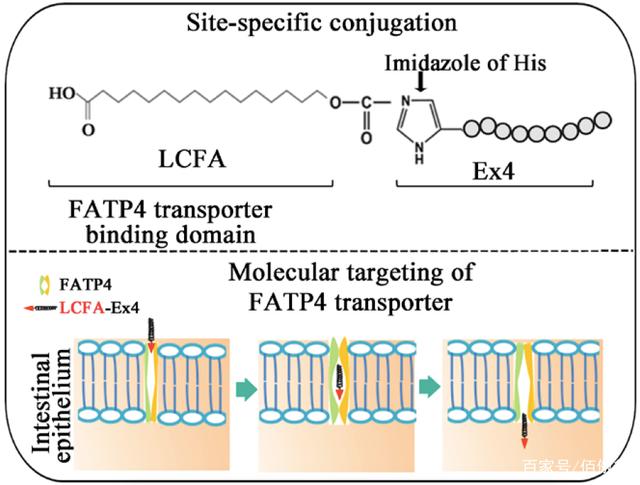
LCFA-Ex4 is transported into cells via FATP4
In vitro experiments used Caco-2 human colon cancer cells with high FATP4 expression and HCC827 human lung cancer cells without FATP4 expression.At the same time, Ex4 cooperates with LCFA, MCFA and SCFA, respectively.Laser confocal microscopy showed that only LCFA-Ex4 could be effectively absorbed by Caco-2 cells.
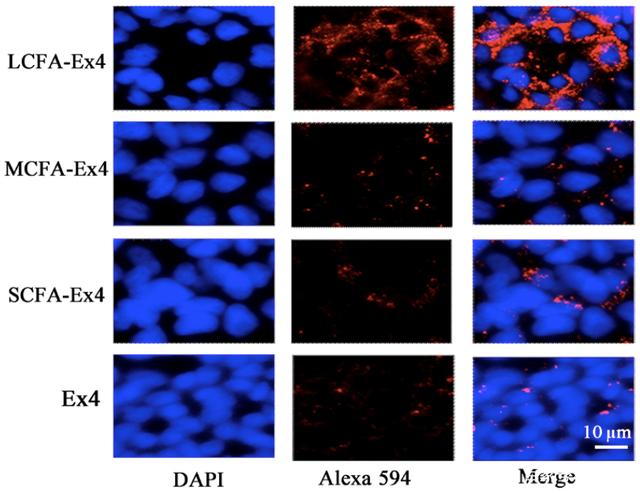
LCFA-Ex4 in Caco-2 cells was significantly higher than that in other groups
In this paper, the coupling reaction of LCFA and Ex4 was introduced through two-part reaction.First, diethyl pyrocarbonate binds to the C-terminal histidine of Ex4 to form an intermediate, which is then coupled by LCFA.At present, many polypeptide drugs on the market prolong the half-life by increasing fatty acid side chains and achieving non-covalent binding with plasma albumin.In this study, it was also found that the half-life of LCFA-Ex4 was more than 2 times longer than that of free Ex4.The hypoglycemic effect of oral LCFA-Ex4 group was similar to that of subcutaneous Ex4 group, 59% lower than that of PBS control group.
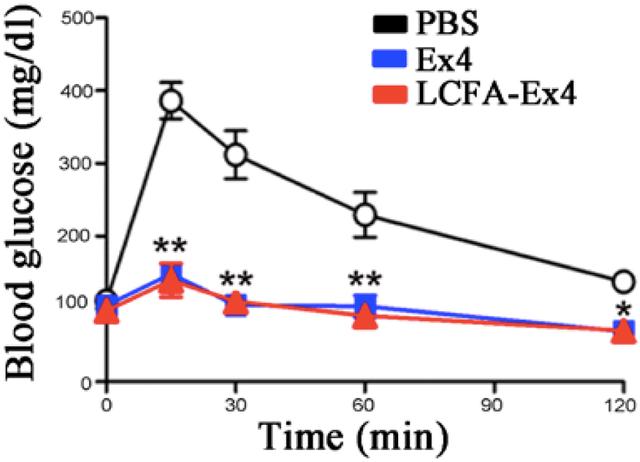
Oral LCFA-Ex4 has the same hypoglycemic effect as subcutaneous Ex4 injection
At the same time, it was found that LCFA-Ex4 was absorbed by FATP4 into intestinal mucosal epithelial cells and then transported to the endoplasmic reticulum rather than lysosome, so Ex4 was finally secreted completely into the lymphatic system.
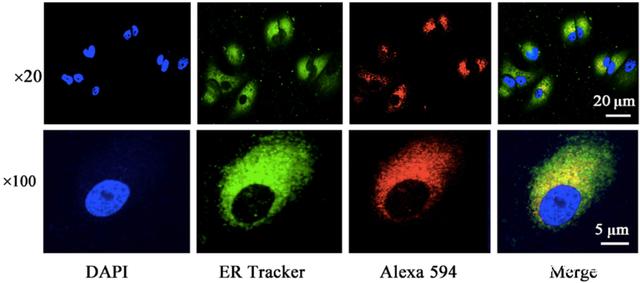
LCFA-Ex4 is mainly distributed in the endoplasmic reticulum of intestinal mucosal epithelial cells
To achieve better oral bioavailability, the authors'team first encapsulated LCFA-Ex4 molecules with liposomes and then used chitosan nanomaterial capsules to resist the corrosion of digestive juices such as gastric acid.By analyzing the content of LCFA-Ex4 in different tissues of mice at different time points, it can be found that LCFA-Ex4 is mainly absorbed through the small intestinal lymphatic system 2-4 hours after oral administration and metabolized out of the body through the kidney.

The absorption of LCFA-Ex 4 conforms to FATP4 distribution and is mainly absorbed by jejunum and ileum within 2-4 hours.
In the animal experiments of C57BL/6 and diabetic model db/db mice, it can also be found that the blood concentration curve of oral LCFA-Ex4 (8mg/kg group) is similar to that of subcutaneous injection, which can effectively reduce the blood glucose level of mice.
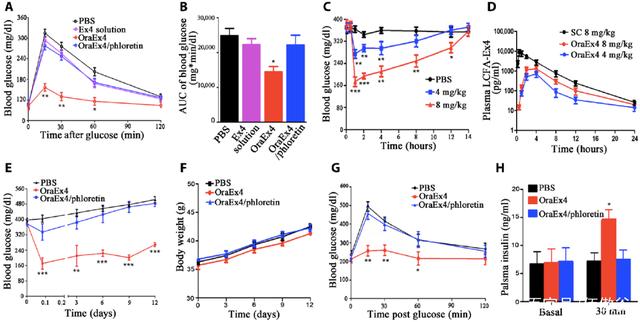
To summarize
Given the successful marketing of oral growth hormone, the important role of SNAC delivery system in achieving oral administration of macromolecules has been widely recognized.It is difficult to achieve a qualitative breakthrough in oral bioavailability in a short time simply by optimizing the polarity, number of hydrogen bonds, molecular weight and other parameters of polypeptide molecules.Developing different drug delivery systems and coupling schemes to promote molecular absorption is the main development direction of oral polypeptide drugs in the future.Peptides, like nucleic acids, are readily degraded by various biological enzymes and reach therapeutic tissues only through special delivery systems.In this paper, through the protection of special liposomes and chitosan nanomaterials, fatty acid polypeptide conjugated drugs can avoid the degradation of digestive juice, and ultimately achieve efficient oral absorption.It is believed that there will be more and more special preparation platform technologies for the development of polypeptide oral drugs in the future.
For any requests of Peptide for research purpose, welcome to contact us. www.gtpeptide.com , sales1@gotopbio.com.


Contact Us
Tel: (+86) 400 610 1188
WhatsApp/Telegram/Wechat: +86 13621645194
+86 15021993094
Follow Us:




 Pharma Sources Insight July 2025
Pharma Sources Insight July 2025


